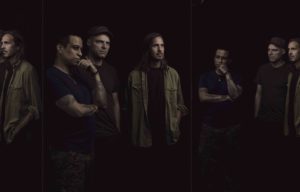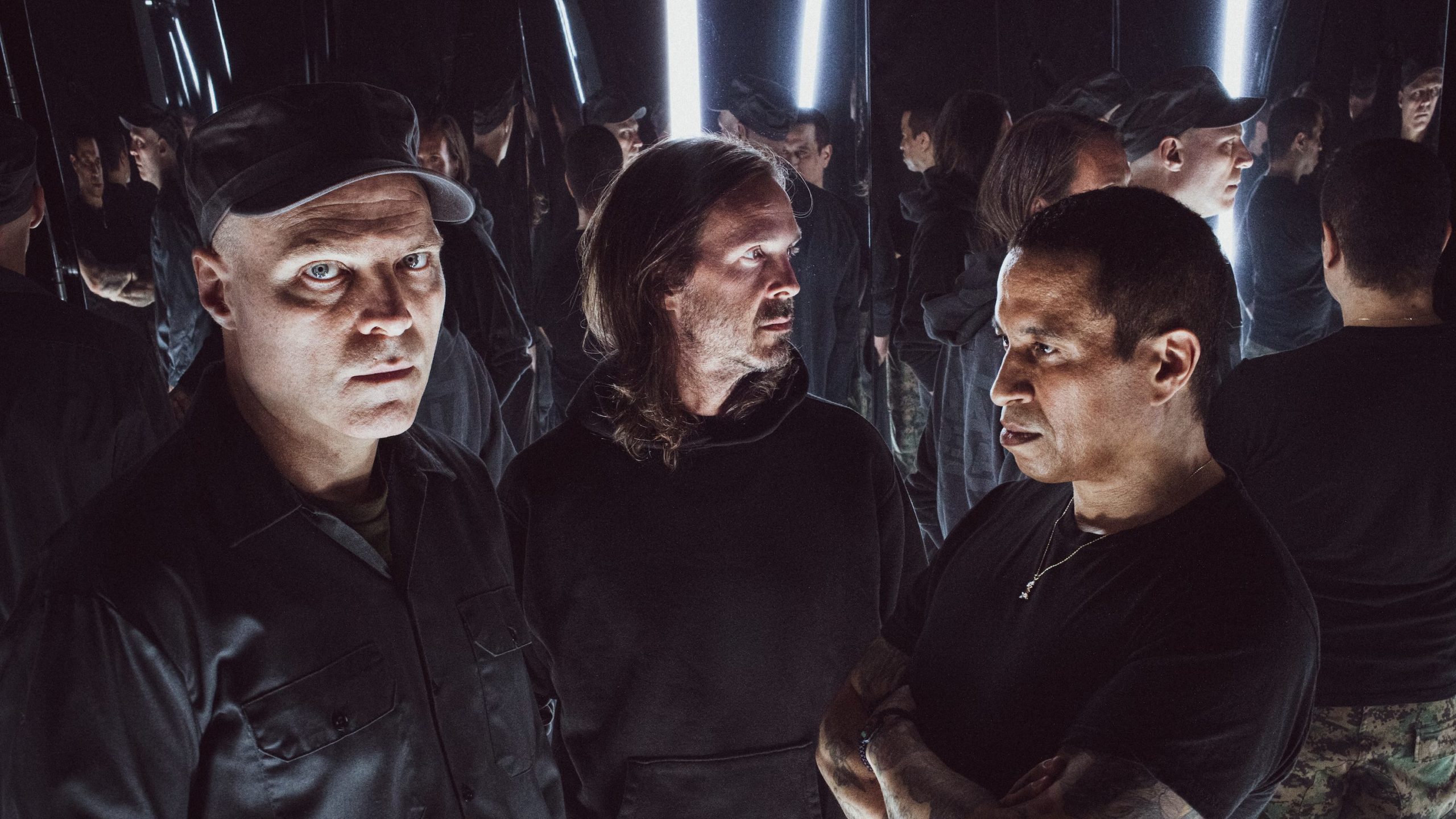Walter Schreifels is many things: a New York hardcore legend whose musical resume includes Gorilla Biscuits, Youth of Today, and CIV; a philosophically minded intellectual who addresses deep questions of existence in his lyrics; and, most recently, a running-wear model you might see blazing past you in a Sonic Youth singlet on the streets of New York City. Of course many people also know him from the hugely influential post-hardcore band Quicksand, whose welcomed 2017 reunion album Interiors was their first release since 1995’s Manic Compression.
For Quicksand’s new album Distant Populations, the band once again teamed up with producer Will Yip to create a record that sees them redefining the sonic identity of the band. This collection of songs sees Schriefels both looking back on his teenage years and speculating into the collective fate of our species. However, despite the heady nature of the lyrics, it’s an incredibly engaging listen that will make you want to start practicing your respective instrument or give up completely in the face of the band’s next-level musicianship.
We caught up with Schriefels to discuss how the album’s title was inspired by a misinterpreted Nausea lyric, the prescience of crust punk’s politics, and the way our technological connections have a way of fostering collective disconnection. Additionally, the band is debuting a new live video performance of their track “Brushed” recently filmed at Brooklyn’s Vinegar Hill Studio—filmed by A.F. Cortes and featuring Stephen Brodsky of Caved In, Mutoid Man, Old Man Gloom, etc.—which you can watch below.
What was it like making this record compared to making Interiors?
Making Interiors was trying to marry Quicksand’s legacy to something that was contemporary. I don’t think I could do a good job of imitating my 20-year-old self; obviously I’m the same person in many ways, but we all wanted to be authentic to ourselves and our interests in the construct of what Quicksand is or was or could be, so that was something that was a bit tricky starting from zero. But the record was really well-received by our fans and I felt like we were really happy with it. When we were out there playing new songs and old songs, it was very informative on how to move forward in creating something new.
Now the trick isn’t to marry this old-timey thing to something contemporary—we are actually contemporary if we choose to pursue it on that thread. We understand what we do well, so [making Distant Populations] was really intentional, beyond “Let’s just try to make something good.” We just felt more in control of what we were doing, whereas with Interiors we were like, “We don’t really know, but we’re just going to feel it out and if it feels right then that’s what we’ll go with and hopefully people will come along for the ride.” With this one maybe there’s a little bit more confidence or understanding.
“Any time we need to get together, we just kind of improvise whatever nervousness needs to come out. People just start playing and we kind of hop on it. So we would just record the soundchecks and we compiled a huge list of ideas.”
When were the songs for Distant Populations written?
A lot of the riffs were coming from soundchecks. Any time we need to get together, we just kind of improvise whatever nervousness needs to come out. People just start playing and we kind of hop on it. So we would just record the soundchecks and we compiled a huge list of ideas—and then we came back and decided which were the ones we were all collectively the most excited to work on. Coming up with an idea or a riff spontaneously is really cool and it can sound like the most amazing thing, but to actually construct it into a song that makes sense takes work. So we were all just making sure that we were down to do that work together and we were all coming with ideas purposefully for a record, especially toward the end of our writing process.
Is it true that the title of the album was taken from a Nausea lyric?
Yes, we had the song “Inversion” and it kind of had this Amebix, dirgey kind of punk vibe to it, so it reminded me of Nausea in some way; it just had that kind of anarcho-punk vibe. There’s a lyric to a Nausea song, but it’s not “distant populations,” it’s something else…I just didn’t know what the lyric was, really. So I got the lyric wrong but “distant populations” just kind of caught my imagination as sort of a catch-all for a lot of anxiety that I could dig into about “the other” and philosophical concepts that I think are cool to dig into for lyrics.

When you’re in a band called Quicksand, it kind of calls for that stuff in a way. There’s a special importance to bands like Nausea, or in that ilk—like Crass or Discharge—especially for me, that speak to the plight of the world in a way that’s transcendent of our contemporary bullshit traps of left and right. Not that those aren’t real things, but they’re really just concepts which are constantly manipulated to divide people, make money, get your way. I think there’s something almost sweet and quaint about some of this ’70s and ’80s anarcho-punk vibe that sees it in clearer and more humane terms.
One song on the record that has a different vibe is “Brushed.” How did that song come about?
It was initially an experiment I did with my nephew. I’m technically pretty inept and my nephew who was 12 or 13 at the time made that little loop and I recorded the guitar parts over it. I presented it to the band in the sense that we’re going for this kind of heaviness on the record, but to have some sort of relief from that. I thought we could do a song like this and if we couldn’t, it was worth a try anyway. I think [bassist] Sergio [Vega] and [drummer] Alan [Cage] really took that static loop and did some interesting stuff that kind of made it our song.
“There’s a special importance to bands like Nausea, or in that ilk—like Crass or Discharge—especially for me, that speak to the plight of the world in a way that’s transcendent of our contemporary bullshit traps of left and right.”
As far as the lyrics go, it’s just the idea of people looking outside themselves for the answer when a lot of the time you don’t have control and you really have to take stock of your own roles in things. Where can I go in the future, and what is my role in allowing these things to happen? Because I have much more control over that part of the game than I do what happens to me randomly, what’s thrown on my plate. It’s about taking stock of your own role in things, and I think that’s a recurring theme with the record: The modern world where we live in our contemporary society has all these different micro and macro pressures, and how do you navigate that? What is your system and how do you take stock of your own role in that?
How do you think that fits into the larger theme of the record? Do you see it as connection versus disconnection?
Loosely speaking, when I was speaking of distant populations I was thinking of people getting hit by a tsunami in Indonesia or something like that where thousands and thousands of people die and it’s a little story on the news. How is that related to our lives here? Or the World Trade Center gets hit and all of a sudden there’s war in the Middle East and these sort of geopolitical things. Then also being on the subway, our inability to be bored and just sit when everyone is so engaged in the concept of their own individuality. There’s no way to put that genie back in the bottle, obviously, but we’re all curating—our social media, for example. I’m not the first person to talk about this but it’s my own perception of how we’re free to create and make our choices to live our best lives, but we’re increasingly alone and isolated regardless of our interconnectivity. Increasingly, I think we’re on the one hand informed and on the other hand sort of callous to a lot of what’s happening to us. I think this is a tricky thing for everybody; I think a lot of people are stressed out and for good reason. FL









